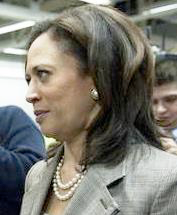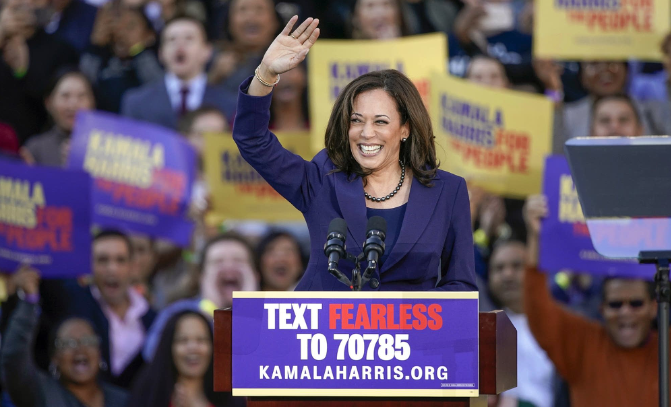CommentsCALBUZZ--With uncharacteristic restraint, Calbuzz balks when people around the country ask us whether Kamala Harris is for real, or just the flavor of the week.
Not because California’s junior senator isn’t smart, savvy and articulate. She’s all that and more. And it’s not because we have a problem with the role she’s played opposing the death penalty, supporting a pathway to citizenship for undocumented immigrants or assisting as an anti-Trump inquisitor on the U.S. Senate’s Committee on the Judiciary.
It’s because, after watching her in San Francisco and California for more than a decade, we truly don’t know whether she operates from a core of cogent and steadfast political values — or merely from a concatenation of constant calculation as to what position most benefits her politically.
The latter, of course, wouldn’t make her much different from a lot of politicians. But her nascent presidential campaign appears to turn on the fundamental premise of authenticity, not only owing to her personal narrative as a mixed-race woman, but also to her record, allegedly that of a principled progressive crusader.
Some skeptics already have noted her refusal to take stands on crucial statewide ballot measures to reform the criminal justice system, an issue on which she should have provided clear and explicit leadership. Others have pointed to her sometimes hardline/sometimes softline performance as San Francisco District Attorney. All this is worth considering, as our friend George Skelton has in the LA Times and as Lara Bazelon did in the NY Times.
We have our own concrete example of the Kamala Equivocation Conundrum.
Evasive pettifoggery. Consider the case of the FBI versus Apple in late 2015 and early 2016. We wrote about it then (and included our interview with Harris), rather ungraciously (for which we criticize ourselves severely) asserting that “Kamala Harris and Loretta Sanchez [her opponent for Senate] are evasive, elusive and equivocating pettifoggers incapable of giving a straight answer to a straight question.”
On Dec. 2, 2015, Syed Rizwan Farook and Tashfeen Malik, a married couple living in the city of Redlands, targeted a San Bernardino County Department of Public Health training event and Christmas party, killing 14 people and injuring another 22 in a terrorist attack consisting of a mass shooting and an attempted bombing at the Inland Regional Center in San Bernardino.
After the fact, the FBI, as part of its investigation and suspecting a third conspirator, prevailed on Apple Corp. in court to unlock Farook’s county-issued iPhone, relying on the All Writs Act of 1789, which says that federal courts can issue “all writs necessary or appropriate in aid of their respective jurisdictions and agreeable to the usages and principles of law.” Apple refused, citing its commitment never to violate its users’ data security and civil liberties.
Apple refused, citing its commitment never to violate its users’ data security and civil liberties.
“The implications of the government’s demands are chilling,” Apple said in a letter to customers. “If the government can use the All Writs Act to make it easier to unlock your iPhone, it would have the power to reach into anyone’s device to capture their data. The government could extend this breach of privacy and demand that Apple build surveillance software to intercept your messages, access your health records or financial data, track your location, or even access your phone’s microphone or camera without your knowledge.”
The FBI versus one of California’s most important companies. Surely, California political leaders would have to take sides. U.S. Sen. Dianne Feinstein sided (wrongly we thought) with the FBI. Outgoing Sen. Barbara Boxer equivocated. Kamala Harris, the state’s Attorney General, running for the Democratic nomination to the U.S. Senate, would be an important voice.
Or so we thought, when we ambushed her on the sidewalk as she tried to flee out the back door and jump into her awaiting SUV at the California Democratic Party State Convention in San Jose on the evening of Feb. 26, 2016.
Here’s our transcribed “interview”:
 Calbuzz: We’re told that you haven’t taken a firm position on Apple versus the FBI and we can’t believe that the Attorney General wouldn’t take a position. Where are you on that whole thing?
Calbuzz: We’re told that you haven’t taken a firm position on Apple versus the FBI and we can’t believe that the Attorney General wouldn’t take a position. Where are you on that whole thing?
Harris: I don’t think it’s that simple so I’m not going to choose one over the other because it’s not that simple.
There’s no question that we’ve got to figure out what we’re going to do in terms of protecting peoples’ privacy, that’s the work that I’ve done as Attorney General my entire career as Attorney General and I have a lot of examples of that work. But most of the progress that we’ve made has been because we’ve brought the technology in to sit down and deal with their responsibility and knock heads when we must.
We did that over mobile apps we’ve done it on the work that we’ve done on cyber-exploitation. That has to happen. There has to be some understanding and some give that’s going to be the result of these two groups coming together to figure this out.
CB: But they’re not coming together, they’re in court. Do you feel that the FBI has a legitimate position to say that Apple’s basically got to invent this new software in order to get into the phone?
KH: I believe we’re always going to see a tension between the need to protect individuals’ privacy and the need for law enforcement to have the tools that we need to investigate crime and hold people accountable. That’s always going to be a tension.
CB: If you were in the U.S. Senate, you’d be expected to say whether you think the FBI is overreaching here or not or whether you are defending a company from California.
KH: I am the Attorney General of California and based on everything I know, I can tell you that it is not that simple. So that’s my answer and there are a lot of variables that must be discussed and figured out and it’s not as short as picking a side. That’s not the answer.
CB: Well, somebody’s going to pick a side in court, aren’t they?…C’mon, when you weigh those two things (privacy vs. law enforcement) where’s the 51% and where’s the 49%?
KB: It depends on the facts of the case. It’s not that simple
CB: Are you familiar with …
KH: I gotta’ go.
There you have it. Many words signifying nothing.
Argumentative argument. So, we delighted to see that on the presidential campaign trail, Harris – at least for now – has taken firm, forthright stands for a middle-class tax cut, higher taxes on the rich, a Green New Deal, protection of foreign-born children, a pathway to citizenship for undocumented immigrants, Medicare for All and opposition to Donald Trump’s border wall. She also says he personally opposes the death penalty.
On her record as a prosecutor and attorney general, she argues, “I have been consistent my whole career…I have also worked my whole career to reform the criminal justice system.”
Those arguments are more, well, argumentative. But whether they will have traction against her from the left is doubtful. Her bigger problem would be from the right in a general election when she is attacked on the death penalty, her handling of immigration and drug cases in San Francisco and other charges that she’s soft on crime.
Nor has she been pressed yet on how she’ll approach Israel and the Palestinians, U.S. intervention in Afghanistan and Iraq, conflicts with Russia and China, labor opposition to trade deals like NAFTA and TPP, etc. We’ll see her willingness to stand firm on those kinds of issues soon enough, along with how forthright she remains in the face of serious and even vicious opposition.
We have high hopes but our experience with her makes us wary.















